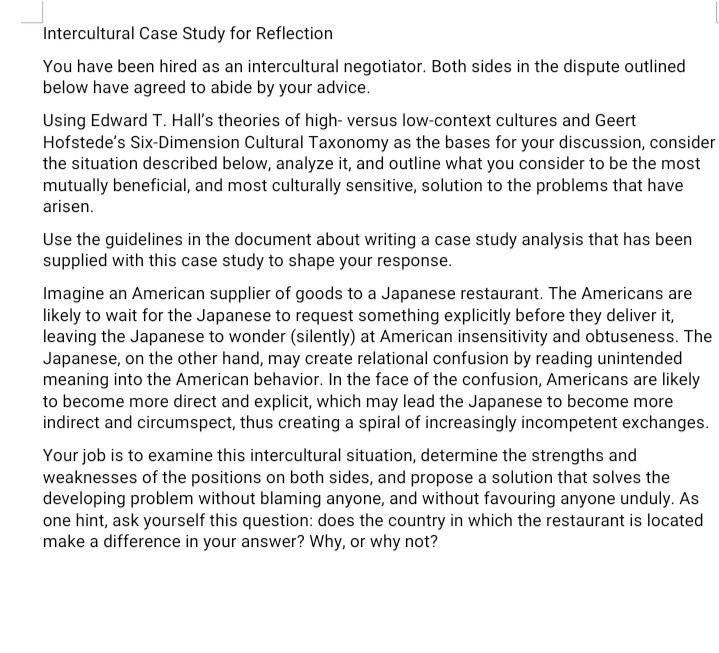Answered step by step
Verified Expert Solution
Question
1 Approved Answer
Intercultural Case Study for Reflection You have been hired as an intercultural negotiator. Both sides in the dispute outlined below have agreed to abide by

Intercultural Case Study for Reflection You have been hired as an intercultural negotiator. Both sides in the dispute outlined below have agreed to abide by your advice. Using Edward T. Hall's theories of high- versus low-context cultures and Geert Hofstede's Six-Dimension Cultural Taxonomy as the bases for your discussion, consider the situation described below, analyze it, and outline what you consider to be the most mutually beneficial, and most culturally sensitive, solution to the problems that have arisen. Use the guidelines in the document about writing a case study analysis that has been supplied with this case study to shape your response. Imagine an American supplier of goods to a Japanese restaurant. The Americans are likely to wait for the Japanese to request something explicitly before they deliver it, leaving the Japanese to wonder (silently) at American insensitivity and obtuseness. The Japanese, on the other hand, may create relational confusion by reading unintended meaning into the American behavior. In the face of the confusion, Americans are likely to become more direct and explicit, which may lead the Japanese to become more indirect and circumspect, thus creating a spiral of increasingly incompetent exchanges. Your job is to examine this intercultural situation, determine the strengths and weaknesses of the positions on both sides, and propose a solution that solves the developing problem without blaming anyone, and without favouring anyone unduly. As one hint, ask yourself this question: does the country in which the restaurant is located make a difference in your answer? Why, or why not? Intercultural Case Study for Reflection You have been hired as an intercultural negotiator. Both sides in the dispute outlined below have agreed to abide by your advice. Using Edward T. Hall's theories of high- versus low-context cultures and Geert Hofstede's Six-Dimension Cultural Taxonomy as the bases for your discussion, consider the situation described below, analyze it, and outline what you consider to be the most mutually beneficial, and most culturally sensitive, solution to the problems that have arisen. Use the guidelines in the document about writing a case study analysis that has been supplied with this case study to shape your response. Imagine an American supplier of goods to a Japanese restaurant. The Americans are likely to wait for the Japanese to request something explicitly before they deliver it, leaving the Japanese to wonder (silently) at American insensitivity and obtuseness. The Japanese, on the other hand, may create relational confusion by reading unintended meaning into the American behavior. In the face of the confusion, Americans are likely to become more direct and explicit, which may lead the Japanese to become more indirect and circumspect, thus creating a spiral of increasingly incompetent exchanges. Your job is to examine this intercultural situation, determine the strengths and weaknesses of the positions on both sides, and propose a solution that solves the developing problem without blaming anyone, and without favouring anyone unduly. As one hint, ask yourself this question: does the country in which the restaurant is located make a difference in your answer? Why, or why not
Step by Step Solution
There are 3 Steps involved in it
Step: 1

Get Instant Access to Expert-Tailored Solutions
See step-by-step solutions with expert insights and AI powered tools for academic success
Step: 2

Step: 3

Ace Your Homework with AI
Get the answers you need in no time with our AI-driven, step-by-step assistance
Get Started


